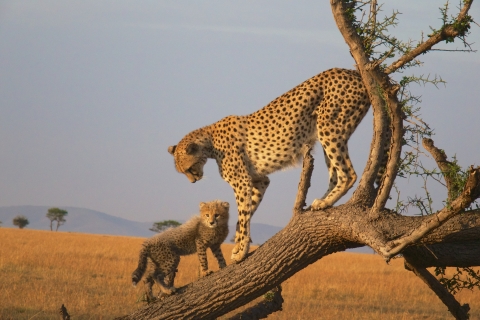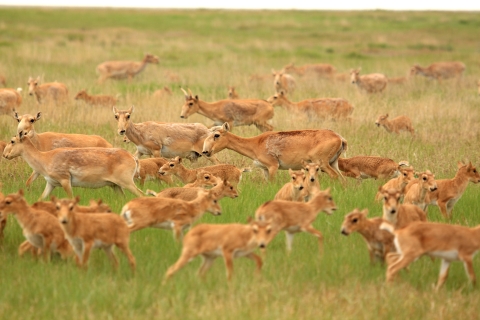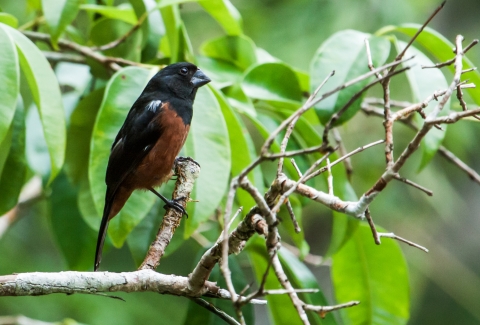Wildlife trafficking is a multibillion-dollar business involving the illegal harvest and trade of animals and plants. The U.S. Fish and Wildlife Service’s Combating Wildlife Trafficking Program within International Affairs is addressing this threat through its Species Conservation Catalyst Fund (SCCF).
The SCCF aims to reduce wildlife trafficking for selected species by addressing the social, cultural, and economic drivers of the illegal trade. The fund is envisioned as a ‘conservation accelerator’ to launch or grow projects, support skill building, and develop networks of researchers and practitioners working across the trade chains of particular species or groups of species. The SCCF supports projects that:
- Conserve species or species groups that are primarily threatened by illegal trade and have not yet received substantial funding from donors globally to address this threat;
- Catalyze sustained change across trade chains, including demand, transit, and range states; and
- Advance the evidence base, by building strategies that are grounded in science and data to reduce species trafficking.
New priority species (including plants and animals) will be identified and announced over time. Funding levels and timelines will vary for the selected species based on conservation need, funding availability, and suitable proposals received. The SCCF expects to invest up to $5 million over ten years in each selected species or species group, and aims to catalyze on-the-ground conservation action and mobilize a longer-term effort that recovers populations of declining species.
Through this fund, we hope to spark sustained change that mitigates threats from unsustainable, illegal trade and contributes to the recovery of these wild species.
Current Funding Opportunity
There are no open funding opportunities. Please check back or contact the Program Officers below for announcements about future opportunities and selected species.
Ongoing Initiatives
The SCCF currently includes three species initiatives. New species will be announced in the future.
Cheetah
The SCCF Cheetah initiative supports efforts to address the poaching of cheetah cubs from range countries in the Horn of Africa, and to address the drivers for demand in the Arabian Peninsula. Project partners apply a complimentary multi-pronged approach which includes:
- Collecting novel field data to learn where cheetah are distributed in the Horn of Africa;
- Strengthening law enforcement collaboration in Africa and the Arabian Peninsula;
- Using social science research to understand the cultural and economic drivers for cheetah trafficking in both Africa and on the Arabian Peninsula; and
- Working with governments and in-country academic institutions to build scientific capacity for range countries to monitor and study cheetahs, and care for cheetah confiscated by authorities.
Financial assistance awards for cheetah were initiated in 2022. Cheetah partners currently include the African Wildlife Foundation, International Fund for Animal Welfare, Cheetah Conservation Fund, and Colorado State University.
Read more about the SCCF Cheetah initiative:
- Financial assistance awards for cheetah
- Closed 2022 Notice of Funding Opportunity and Frequently Asked Questions
For more information, please contact Yula Kapetanakos, PhD, Cheetah Program Officer (pronouns: she/her) and Christine Browne, PhD, Cheetah Social Scientist (pronouns: she/her).
Saiga Antelope
The SCCF Saiga initiative supports efforts to address the poaching and trafficking of saiga antelope across the entire trade chain. Project partners apply strategic approaches to ensure:
- Saiga populations are protected and conserved in their native habitats;
- Saiga horn stockpiles are quantified and managed transparently; and
- Demand for saiga horn is understood and reduced across consumer countries.
Efforts are also underway to build relationships among partners in saiga conservation, fill evidence gaps, share knowledge and training, and leverage communications tools (e.g., Saiga News and Saiga Resource Centre).
Financial assistance awards for saiga were initiated in 2022. Saiga partners currently include the Association for the Conservation of Biodiversity in Kazakhstan, Wildlife Conservation Society, TRAFFIC International, University of Oxford, Fauna and Flora International, Saiga Conservation Alliance, and Ekomaktab in Uzbekistan.
Read more about the SCCF Saiga initiative:
- List of financial assistance awards for saiga
- Saiga award announcements by the Convention for Migratory Species
- Saiga Antelope: A Conservation Success Story (FWS article)
- Closed 2022 Notice of Funding Opportunity and Frequently Asked Questions
For more information, please contact Tatiana Hendrix, Saiga Program Officer (pronouns: she/her) and Jessica Bell Rizzolo, PhD, Saiga Social Scientist (pronouns: she/her).
Songbirds
The SCCF Songbird initiative supports efforts to reduce the illegal, unsustainable international trade of songbirds native to the Guiana Shield and Caribbean for singing competitions in North America and Europe. The 15 priority songbird species include seed-finches, seedeaters, and other species traded for their songs.
Project partners apply a targeted approach that includes:
- Understanding and reducing illegal, unsustainable demand;
- Assessing the viability of legally and sustainably sourced songbirds that contribute to local community livelihoods;
- Improving laws, policies and other protections for birds and people;
- Strengthening law enforcement capacity; and
- Enhancing local and global awareness of songbird trade issues.
Financial assistance awards for saiga were initiated in 2024. The primary award recipients are Birdlife International, Center for International Forestry Research, International Fund for Animal Welfare, Monitor Conservation Research Society, Sustainable Innovation Initiatives, The Consultancy Group Inc, and Virginia Polytechnic Institute and State University. Numerous other partners that will help implement projects include but are not limited to: the Brazilian Institute of Environment and Renewable Natural Resources, Green Heritage Fund, Guyana Wildlife Conservation and Management Commission, Oxford University, School of Veterinary Medicine at the University of the West Indies, South Rupununi Conservation Society, Wildlife and People Suriname, University of Guyana, and University of Florida.
Read more about the SCCF Songbird initiative:
- List of financial assistance awards for songbird
- For a song: Service works with partners to address songbird smuggling (FWS article)
- Closed 2024 Notice of Funding Opportunity, Frequently Asked Questions and announcement in Translation in Español, Português, Nederlands and Français.
For more information, please contact Jen Miller, PhD, Songbird Program Officer (pronouns: she/her) and Emily Horton, PhD, Songbird Social Scientist (pronouns: she/her).



